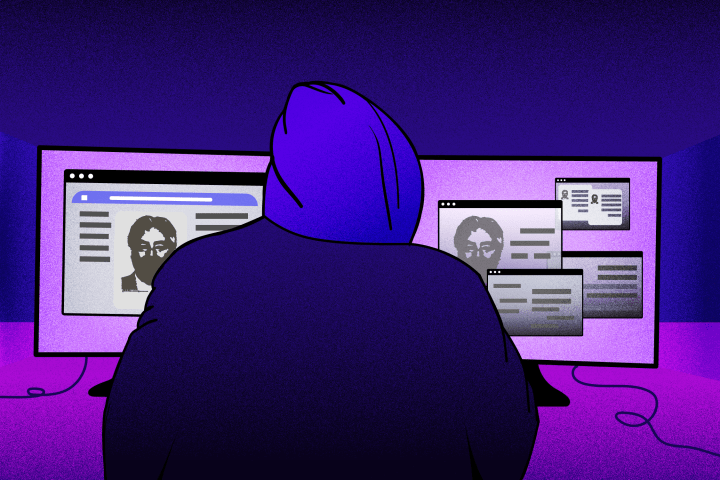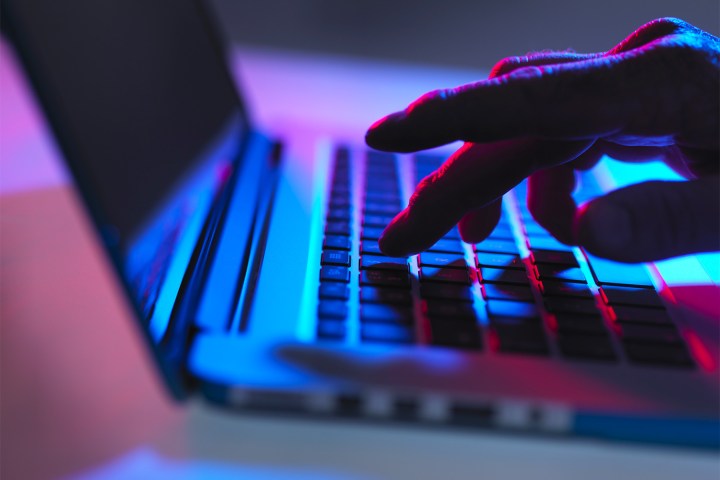
Editor’s Note: This article was written under a pseudonym due to the safety concerns of the author. The last names of some of those interviewed have also been omitted due to safety concerns.
When protests erupted across the country to support Black Lives Matter, I knew I had to do my part to oppose systemic racism. But after hours of marching and chanting, it didn’t feel right for me to just leave the fight at the door. I yearned to do more.
But not long after the protests began in May, Facebook recommended a new group for me, one dedicated to ‘outing’ people posting racist messages, posts, and memes on social media. I found like-minded activists devoting themselves to a singular cause: Getting racists fired.
I got involved. For us, it’s important that racists face consequences for sharing neo-Nazi talking points and bigoted comments online.
The history of getting racists fired online on Facebook and beyond

Facebook groups that aim to expose racists on the internet aren’t a novel idea.
One page called “Getting Racists Fired” has over 13,000 likes on Facebook. The founder of the page — who didn’t reveal their name — said they run the page with six other moderators.
“Outing racists is the absolute least we can do and only requires a minimal amount of effort”
The page was founded six years ago in 2014 after police officers killed Michael Brown, triggering protests in Ferguson and across the country.
“Outing racists is the absolute least we can do and only requires a minimal amount of effort,” the founder said.
But those efforts have spread across the internet in recent years. Whether it’s on Facebook, Instagram, Twitter, Reddit, or TikTok, there’s bound to be at least one celebrity getting “canceled” over racist remarks or a CEO stepping down due to allegations of racism in the workplace.

But I’m not interested in outing celebrities or high-powered executives.
Since the recent protests spurred from the killing of George Floyd in Minneapolis, there has been a push among activists and anti-racist vigilantes to expose the “everyday racists” — whether it’s the average Joe working in a home improvement store or a Karen ranting in Kentucky.
Some of these groups just want to share instances of racism they’ve witnessed on social media. Other communities focus solely on getting people fired for racist remarks they’ve publicly made on social media.
Occasionally, a member of one of these groups who is more daring may aim to infiltrate white nationalist groups online and expose them from within. They all have the same end goal: Uncover racism and racists on the internet.
Why I got involved

In the groups I have joined, people exchange screenshots of others saying racist things with another screenshot of that person’s public Facebook profile, which often lists where that person works.
Members of the groups are then free to do what they want with the screenshots.
Some share the post to their own profile while others report the racist’s profile to Facebook. Occasionally, someone will quietly forward the screenshot over to that person’s employer, or even to their family.
During my time in these groups, I’ve forwarded a few screenshots to racists’ employers that were publicly listed on Facebook. I’ve even followed up one incident with a phone call and messages to make sure the racist person would be disciplined and that the company was taking it as seriously as I was.
However, I don’t go digging to find people’s jobs that aren’t listed publicly. That feels unethical to me.

There is a righteous sense of vigilante justice when an outed racist gets their just desserts.
These people are our doctors, nurses, and teachers. They should not be working in their jobs where they will have contact with BIPOC (Black, Indigenous, People of Color) individuals if they have clear racial biases.
I feel helpless in simply reporting racist content on Facebook, only to get a message back saying that the message I reported doesn’t violate Facebook’s community standards. This has only worsened since the number of moderators has decreased on the platform due to the coronavirus pandemic, according to CNBC.
Thus, it’s only fitting that people, myself included, would resort to other measures — such as getting people fired.
How the vigilantes fight racism

So what constitutes a message or social media post that gets forwarded to someone’s employer? There aren’t many ground rules set in stone among the groups I’m in.
We search for definitive proof that the racist comment was made by using screenshots we take directly as opposed to hearsay. But the line for which racist statements deserve action and which are too minor to address is up for debate.
The groups are decentralized, with people sometimes sharing memes in between the usual vitriol we root out. Personally, I only target racists for comments that feel egregiously foul.
You would be surprised how commonplace it is to see racial slurs being slung around like martinis at happy hour on social media or to find violent threats, hate speech, derogatory memes, and the like online.
To me, someone saying #AllLivesMatter is not only ignorant and misguided but also often racist. But I don’t think a comment like that is enough for us to get someone fired.
Furthermore, I always make sure that the screenshot is verified. If I can’t seem to find the racist post in question on that person’s account, I won’t send it to their workplace.
It’s too easy to Photoshop and doctor screenshots. Taking away someone’s livelihood is a serious step and should not be treated as a game.

Marylin Widd, another member who joined one of my groups last month, explained she focuses on those who “proven by their own writing, were extremely racist.”
“Not just a tiny off-color joke, which I don’t like, but I’m not comfortable about that getting someone fired,” she told me. “It had to be something more extreme.”
Widd said she has been involved in three firings where she sent emails and made a phone call to workplaces.
Another member of one of the groups I’m in, Lauren, says she also has gotten someone fired.
“It took some time because the company he initially was working at did not fire him immediately and they refused to respond to me for follow-up, but after a few weeks, it looks like they let him go and he went to another company,” she said. “He only listed that one and I got him fired from that one, too.”
While some who join these groups are already well-embedded in the anti-racist movement, many have no activism experience.
“I’ve never been an advocate, and this isn’t my scene, honestly,” said Allie, a member of one of these groups. “But I feel like with what is going on in the world, everyone should speak up against [racism]. The world has stood silent for too long and look where it got us.”
She says she has gotten a total of 36 people fired for making racist statements on Facebook.
Allie said she was from a “small town full of ignorant people” and never fit in.
“It took the [Black Lives Matter] movement for me to truly see what the difference is between me and them,” she said.
Doxxing: A legal minefield

While outing racists is effortless for the most part, it can also be an ethically and legally questionable minefield.
Most people seem careful to share only information publicly listed to avoid doing something illegal. The groups I’m a part of mostly police themselves through moderators and admins who delete activists and posts which take things too far.
But outing racists can sometimes veer over the line into doxxing — the practice of posting private information publicly to encourage harassment.
Doxxing is considered a crime in states such as California. Salar Atrizadeh, a lawyer specializing in internet, technology, and computer law in Beverly Hills, told me doxxing is “usually done by searching public databases and social media websites. It’s a type of online vigilantism and hacktivism.”
Doxxing can be used for “unlawful or unethical reasons such as harassment, extortion, or coercion,” he said.
According to Atrizadeh, doxxing could be a violation of California Penal Code 653.2, a misdemeanor that can lead to imprisonment or fines of up to $1,000.
So, is sharing screenshots of racist messages and posts of people legal?
“If the posted information was legally obtained, then it probably won’t be illegal to repost it as long as it does not incite violence, harm, or harassment against that person,” Atrizadeh said. “However, if you obtain the personal information by hacking into that person’s electronic device or email account, then it would be illegal to repost it.”
Posting personal information like private photos, social security numbers, or the person’s date of birth would be considered an illegal invasion of privacy, he added.
“There is a fine line between acting in the public interest and defamation,” Atrizadeh said.
Legal quandaries aside, questions have also been raised about the ethics of ‘exposing’ racists. Misidentifying people is always a risk.
In 2017, a man was misidentified as a participant in the Unite the Right Rally in Charlottesville, Virginia by internet investigators.
Another high profile misidentification case happened just last month after a viral video surfaced of a man riding a bicycle, assaulting what appeared to be children. Online sleuths incorrectly targeted a finance marketing executive who was entirely innocent.
Further, photoshopped screenshots are also always a possibility and thus, one may be unwittingly sharing fake messages and posts. I worry about that myself. Though I’ve always double-checked racists’ profiles and posts before taking any action, others may not.
Exposing racists can also be dangerous for the person sharing the screenshots and messages and can often lead to them being doxxed — especially those who target white supremacists and other hate groups.
Infiltrating groups — and courting retaliation

Some activists in my groups have infiltrated Confederate Flag support groups, anti-Black Lives Matter groups, and white supremacist groups on Facebook.
Allie is one of those individuals who has made it her mission to infiltrate these groups. She sneaked into a racist Facebook group a few weeks ago and worked to have one of its members fired from his job.
The group soon realized that this was the work of an online ‘troll’ in the group — Allie — and doxxed her, she said.
“He lost his job of 10 years and that was when the harassment started,” she said. “I had to change my phone number. It didn’t really help much because someone had already found my information and I got a handful of threats. They went as far as messaging everyone I know and informing them about all the little details.”
She told me she has since installed cameras and an alarm system for her protection.
While activists infiltrate racist groups, members of those groups have also, in turn, started to infiltrate my anti-racist communities on Facebook.
In light of all this, I have taken steps to protect my online presence by locking my Facebook profile down and changing my name to protect my identity from potential doxxers.
Lately, I have been distancing myself from getting racists fired due to a fear of backlash. The threats of being harassed, the constant barrage of awful people, and the uncertainty of whether racists ever face consequences was mentally and emotionally draining.
But despite the potential for danger, harassment, and death threats, the movement to get racists fired isn’t going to end anytime soon. The groups keep growing and people continue to get fired for bigoted social media posts.
I’ll continue to participate in these online communities to help others root out bigotry.
Racism — and racists — aren’t going anywhere. Neither will I.



